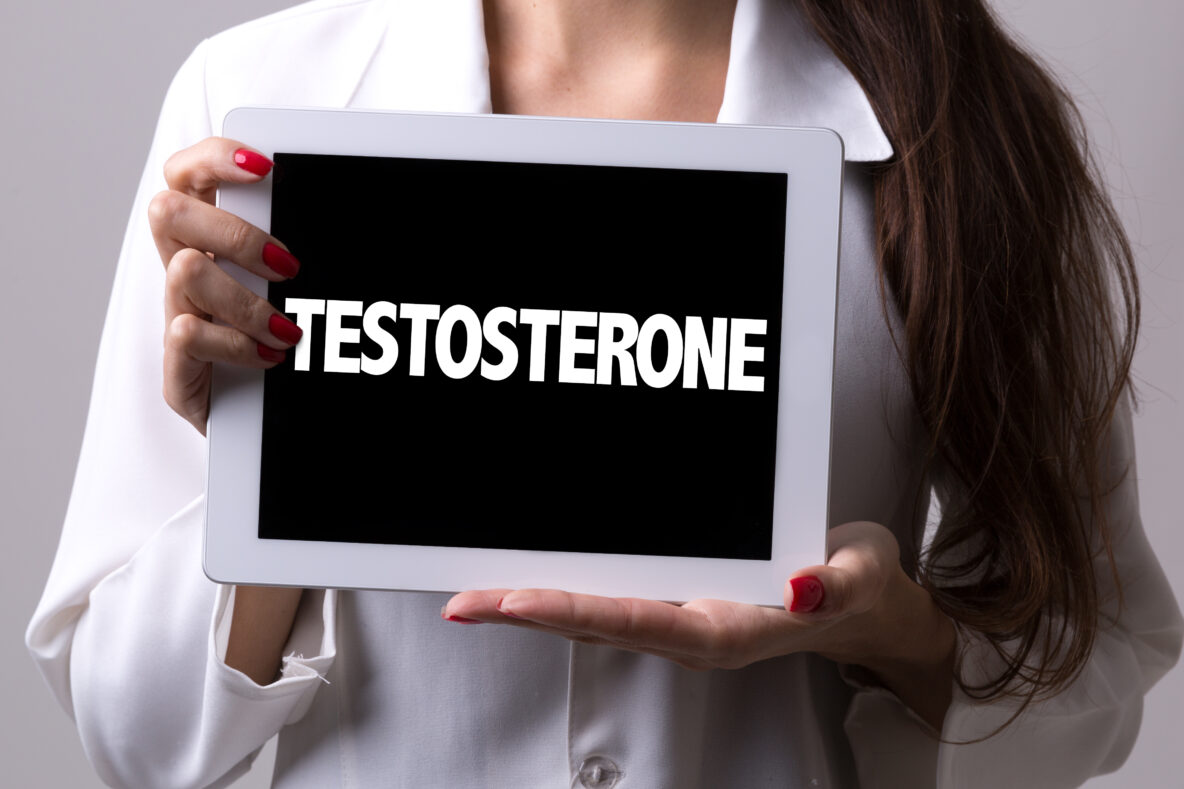Testosterone is a steroid hormone mainly associated with male characteristics such as facial hair, a deep voice, sperm production, libido and the maintenance of muscle mass and strength.
However it plays a crucial role for women too, including bone and brain health as well as sex drive and energy. We only make about 5% of the levels men make, but it's a hormone that we definitely need!
And just like oestrogen and progesterone, testosterone levels decline during and post menopause, and this can result in a variety of health issues and symptoms if not addressed.
Watch the video below or listen to the podcast (episode 138).
Common symptoms of low testosterone
- Reduced Libido: One of the primary symptoms of low testosterone is a decrease in sexual desire, arousal, orgasm and overall sexual function.
- Fatigue: it's linked to energy production, motivation, and a positive mood. Low testosterone can result in fatigue, low energy, and mood swings.
- Mood Changes: Women with low testosterone may experience mood swings, irritability, increased anxiety, or even depression.
- Sleep Disturbances: Insomnia or poor sleep quality can be associated with low testosterone levels.
- Muscle Weakness: it plays a pivotal role in preserving lean muscle mass and strength in both men and women. It contributes to the development and maintenance of muscles, helping women stay physically resilient. Some women may notice a decrease in muscle strength and muscle mass.
- Weight Gain: Testosterone can affect fat distribution in the body. Low testosterone levels may contribute to an increase in body fat, particularly around the abdomen.
- Bone Health: It supports the maintenance of strong and healthy bones, so low levels can affect your bone density and increase the risk of osteoporosis.
- Heart Health; Testosterone plays a role in maintaining healthy blood vessels and promoting proper cardiovascular function – a vital protection for women post menopause.
- Hair Changes: it influences the growth of facial and body hair in women. You may experience changes in hair growth, including thinning hair on the scalp or an increase in facial and body hair.
- Skin Changes: Dry skin and a decrease in skin elasticity can occur.
- Cognitive Function: studies suggest that testosterone may have a role in cognitive function. Some women may notice difficulty with concentration, memory, or cognitive abilities.
Ways to Increase Testosterone Naturally
- Resistance Training – while all forms of exercise will benefit testosterone levels, resistance and weight training best stimulate muscle growth and strength. You don't have to go to the gym though, Pilates, dynamic yoga and resistance training at home are just as effective.
- Stress management – we know how damaging cortisol can be generally, and it can stifle testosterone production too.
- Sleep – getting better sleep can help increase your levels.
- Eat protein, healthy fats and good carbs – a well-balanced diet can have a significant impact on hormone levels. Include a variety of nutrient-rich foods in your diet, such as protein (eg, chicken, fish, tofu, beans), healthy fats (eg. avocados, nuts, olive oil), and complex carbohydrates (eg, whole grains, vegetables). Adequate calorie intake is also important, as severe calorie restriction can lower testosterone levels.
- Minimise exposure to xeno-estrogens – choose BPA-free products, opt for organic foods when possible, and use natural skincare products.
- Vitamin D – get sun on your skin, or take a Vitamin D supplement.
- Supplement – some supplements have been shown to increase testosterone levels, including zinc, ashwaghanda, saw palmetto and ginger. Check out my favourite brands here.
Medical Treatment
If you have low testosterone and are struggling with symptoms, this is where it can get very frustrating.
In the UK, according to the NHS, “testosterone is not currently licensed to treat symptoms of menopause, but a specialist doctor may be able to prescribe it for you.”
Some GP's are willing to prescribe the gel or cream ‘off license', but usually only for specific cases such as surgical menopause, premature ovarian insufficiency, low sex drive, or where standard HRT hasn't helped. Many doctors are relucant to do this, but you can ask to be referred to a menopause clinic or specialist doctor if you're not getting anywhere.
Why it can't be a standard treatment is baffling! It's a sex hormone just like oestrogen and progesterone, and there's no evidence that low level treatment is harmful.
If you have any of the symptoms mentioned and suspect your testosterone might be low, I would always recommend you get some tests done first to measure your levels, and rule out any other hormone imbalances that could cause similar symptoms (eg thyroid). We run blood tests for all your sex hormones, plus a deeper 24 hour urine test that also looks at the hormone pathways so we can get a comprehensive pattern of your hormone activity.
Test results can be helpful to take to your doctor as evidence, and there is always the option to get testosterone from a private doctor or clinic.
Remember that individual responses to any of these strategies may vary, and it's essential to consult with a healthcare provider before making significant changes to your exercise routine or supplements, or taking hormone replacement therapy, especially if you have underlying health conditions or are taking medications.
Do contact us if you'd like more information on the tests we offer and our 1-1 support.

